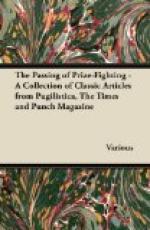At first I regarded him as merely an ordinary intrusive brown rat. I laid down poisonous pills composed of barium carbonate and flour. He did not take offence; he understood our human limitations. He showed by a jaunty cock of the eye that all to understand is all to pardon. His daily visits continued without abatement.
It has been suggested to me that we should await his regular calls with dogs, blood-thirsty terriers. I cannot take so scurvy an advantage of his confidence.
* * * * *
I have sinned. The fault is less mine than that of the High Court of Parliament. I was bidden to study the penalties laid down for those who do not proceed to the destruction of their rats. When I weighed my landlord rat against five treasury notes I confess that in an hour of meanness I permitted the notes to tip the scale. I prepared phosphor paste and laid a trail of this loathsome condiment upon the path trodden every afternoon by my rat.
He came as usual on the day after that on which I had basely planned his murder—Heaven forgive me!—that I might escape a trifling fine, and he deigned to partake of my hospitality. Twenty-four hours later, when duty summoned him once more at the hour of tea, his eye was dim and he staggered slightly in his gait. He was still able to go his rounds, but since that tragic afternoon I have seen him no more.
My family eyes me with suspicion. They look for the rat, which no longer arrives at his accustomed hour. My cook has given notice. I alone bear the burden of the fatal secret.
* * * * *
Saved! What care I for five paltry pounds now that our rat has recovered from his indisposition and has hastened to re-visit his property? The phosphor paste, like arsenic, has added brightness to his eye and brought a beautiful lustre to his smooth brown coat. He has softened in his manner and tends towards friendship. There is less of the grand air, less assertion of the vast gap which yawns between the landlord and the tenant. Presently, if I continue to prove worthy of his condescension, my rat will eat phosphor paste out of my hand.
* * * * *
[Illustration: Jack (to novice in difficulties with the tide). “THE NEXT TIME YOU SPORTSMEN TAKES AN OUTIN’ TRY A NUMBER TWENTY-SEVEN BUS.”]
* * * * *
From the obituary notice of an octogenarian:—
“He was a keen chronologist,
and possessed a valuable collection of
shells.”—Provincial
Paper.
Picked up, no doubt, on the sands of time.
* * * * *
THE LITTLE HORSE.
[The following fragment is taken from the play, David Lloyd George, which we understand may some day be produced at the Lyric Opera House, Hammersmith, as a companion-piece to Abraham Lincoln.]




